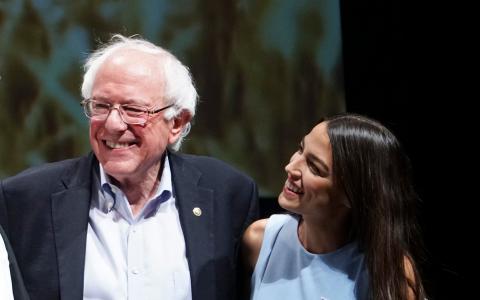
Consensus emerges around higher IRS obligations if a Democrat wins the White House. Without setting odds on the election, the wealthy need to start reaching for post-tax efficiency now.
Bernie Sanders may not accomplish everything he wants in a general presidential election, but he keeps moving the policy conversation toward bigger tax drag on the rich.
His core proposals remain in place from the 2016 primary cycle. If nominated next time around, he wants the government to take a bigger cut out of capital gains and take the estate tax back to a place we haven’t seen since the 1970s.
He also hasn’t abandoned the idea of higher income tax rates as well to help pay for universal healthcare and expanded Social Security benefits.
Of course Bernie talks a lot and rarely gets satisfaction. But he’s moving the rhetorical bar for people who might be in position to get more done in Washington.
His estate tax ideas, for example, are favorably viewed by a majority of the public. And people with billionaire backing like Cory Booker are picking up the baton.
If they’re elected, higher taxes are on the menu. They’re on the menu one way or the other.
If it’s working, Bernie won’t break it
Bernie’s signature proposal is really on the estate planning side, where he wants to drop the cap on tax-free wealth transfers back to $3.5 million and raise the effective rate on billionaires to 77%.
That’s the top rate that prevailed from 1941 to 1977. Whether it would actually generate enough revenue to pay for his social programs is an open question.
Most bona fide billionaires have already locked in planning strategies designed to protect them from the more recent estate tax regime.
After all, while a billionaire dying in Bernie’s world might cost the heirs around $340 million more than they’d give up under the current rules, the IRS gets at least $400 million either way.
That’s a huge incentive for the advisors to shave even 1% or even 0.1% off that ultimate bill. They’ll definitely earn their fees.
And the thing about trusts and other common ultra-high-net-worth vehicles is that the dollars are shielded no matter where the tax rates go.
If the highest estate tax rate stays at 40%, a $1 billion trust can conserve up to $400 million. Should Bernie and his bros get their way, the strategy doesn’t change and the dollars don’t move, but the instrument’s ultimate value climbs to $770 million.
In other words, if an estate plan is already working, Bernie is unlikely to break it. His ambitions just don’t usually rise to the level of legal reform.
He just wants higher notional numbers and a sense of justice. Unshielded billionaires who pay more voluntarily are simply indulging in social philanthropy by another mechanism.
That’s their prerogative. More likely they’ll simply make sure to fund more conventional charities to reduce the size of their taxable estate while established trusts look out for the heirs.
Look to Warren Buffett, Bill Gates and other “tax friendly” mega-billionaires for how that’s going to look in practice.
Because Buffett and Gates have promised to give away their joint $180 billion, that money doesn’t flow through the IRS and doesn’t give Bernie the $138 billion windfall he wants.
(I’ve got to point out that this level of estate tax revenue isn’t sustainable anyway, simply because once the first generation of billionaires is gone, their heirs won’t even be 1/4 as rich. Two generations out, you’re looking at 1/16 the IRS income stream.)
The more ominous note is on capital gains, which everyone in the investor class pays in one form or another, sooner or later.
Bernie wouldn’t mind treating investment income like earned income, theoretically doubling the drag on every dollar high-net-worth portfolios can generate.
A world without special rates for dividends will favor slightly different security selection. As usual, the fate of municipal bonds remains nebulous in a non-specialist debate.
New strategies will evolve to lighten the burden and claw back a little more cash from the IRS. Some will be familiar to long-term investors: tax credits will become more valuable in their own right, creating incentives to put money to work in exempt areas of the economy.
What those exemptions would be and how they’d work, I leave to the big idea people like Alexandria Ocasio-Cortez.
No country for extended tax cuts
The point of all of this is that when taxes go up, there’s more room for people who can even incrementally reduce the drag to demonstrate real, palpable value.
Harvesting capital losses is a joke for someone paying 0%. The only consideration there is respecting the holding period to keep any trade from turning into earned income.
But as the IRS cut grows, the incentive to cut it down to size grows with it. We’ll see more wealth managers promote their ability to deliver real returns to elite clients.
Maybe they’ll only beat the market by 1% or 2% on an after-tax basis. When you’re working with millions, that’s real money, and it’s definitely enough to justify your fees.
Either way, the current tax breaks for individuals mostly expire in 2025. There might be a will at some point in the next presidential term to extend them or even make them permanent.
There’s zero chance that will happen before 2020. The balance of power in Congress will see to that.
The best that people looking to contain their tax bills can hope for right now is for the status quo to continue as long as it can.
If anything changes with rates, it will be in the upward direction.
People who look at these things from a long-term perspective know that if you see taxes going up, you lock in what you have now.
You revisit your trusts. You convert everything you can to Roth or other tax-free instruments.
Because even if Bernie isn’t going anywhere, his buzz is alive and well.



